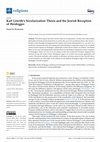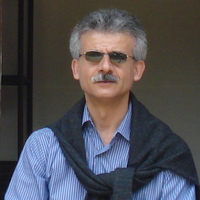Papers by Daniel M. Herskowitz
Accepted for Publication With Journal of Jewish Studies

Modern Jewish Theology, eds. George Kohler and Sam Kessler , 2025
In numerous works, Martin Buber devoted considerable effort to articulate his understanding of di... more In numerous works, Martin Buber devoted considerable effort to articulate his understanding of dialogical religiosity. Recently, scholars have convincingly shown the centrality of the category of gnosis for Buber’s dialogical thinking. However, in addition to gnosis and quite often accompanying it, Buber evoked another ‘spiritual force’ as a foil for his dialogical religiosity, namely, magic. Yet this category is still virtually unaddressed in critical scholarship. In the present study I suggest that like gnosis, Buber regularly grappled with the category of magic and that – again like gnosis – it is of great importance to his thinking. I explore key moments in his oeuvre in which this category is invoked and argue that when situated in context, his construction of magic largely resembled the prevalent conceptual paradigms of his time – though he utilized it for his own purposes and in the context of his concern with, and understanding of, Judaism.

Hans Jonas: The Early Years, edited by Daniel M. Herskowitz, Elad Lapidot, and Christian Wiese , 2024
Anyone who reads Jonas’s two major works on Gnostic literature, the early German *Gnosis und spät... more Anyone who reads Jonas’s two major works on Gnostic literature, the early German *Gnosis und spätantiker Geist* and its later English adaptation, *The Gnostic Religion*, will no doubt recognize the glaring differences between them. Indeed, the English version is not merely a translation of the original German but constitutes a substantial reworking of its project. An account of this reworking, however, has yet to be offered in the extant scholarly literature on Jonas. The aim of this essay is to contribute to filling this gap and to illuminate some aspects of the transformation of Jonas’s Gnosis study. It delineates, from a conceptual standpoint, some core differences between the two studies, and explains, from a historical standpoint, the reasons for them. By examining the transcripts of a lecture series on Gnosticism delivered by Jonas in the Hebrew University in 1938, this essay demonstrates that many of the key differences between his early German study of Gnosticism and his later English version are already present in his Hebrew lectures, thus locating this major shift in Jonas’s work in his pre-war Jerusalem period.
Spiritual Investment in the World: Modern Theologies of Worldliness, edited by Agata Bielik-Robson, 2025
Forthcoming
The Journal of Jewish Thought and Philosophy, 2024
This essay surveys a number of prominent, recurring, and new directions in the growing scholarly ... more This essay surveys a number of prominent, recurring, and new directions in the growing scholarly discourse on the theme “Heidegger and Judaism,” arranged under three headings. The first, the contrastive framing, encompasses cases in which the relationship between Heidegger and Judaism is perceived as antithetical. The second, the conjunctive framing, encompasses views claiming the existence of affinities and parallels between Heidegger and Judaism, grouped under three subheadings: “Heidegger and biblical thinking,” “Heidegger and Kabbalah,” and “Heidegger and the Jewish nation.” The third, historical perspectives, uses the approach of intellectual history to explore visions of Judaism that are developed as part of engagements with Heidegger’s philosophy.

History of European Ideas, 2024
This study argues that the bond between ‘secularization’ and ‘de-legitimation’ is not only borne ... more This study argues that the bond between ‘secularization’ and ‘de-legitimation’ is not only borne out in debates over grand historical narratives relating to the status of modernity, as argued by Hans Blumenberg, but in debates over the appraisal of specific modern philosophical programs as well. It does this by examining how the category of ‘secularization' is used to delegitimize Martin Heidegger's thought, from both theological and secular perspectives, by two of his former students, Hans Jonas and Karl Löwith. By analysing their interpretation of Heidegger and their understanding of secularization, legitimacy, and the philosophy-theology relationship, this study sheds light on the intellectual projects of these three thinkers – master and two students – and demonstrates the application of secularization as a hermeneutical category of de-legitimization on the basis of ‘insufficiency’ – either insufficiently secular or insufficiently religious.
Hans Jonas und die Marburger Hermeneutik, Andreas Grossmann/Malte Dominik Krüger (eds.), Frankfurt am Main: Klostermann 2023, 83-109, 2023

Jewish Studies Quarterly, 2023
This article offers a critical examination of the role of Martin Heidegger’s
philosophy in Micha... more This article offers a critical examination of the role of Martin Heidegger’s
philosophy in Michael Wyschogrod’s most important work, Body of Faith: God in the People Israel, and explores its intersection with this work’s more acknowledged debt to Karl Barth’s theology. It explores the uses of these two key intellectual sources for Body of Faith and reflects on how this illuminates some of the basic assumptions, motivations and also shortcomings of Wyschogrod’s Jewish theology. It demonstrates that Wyschogrod follows Barth in his decisive emphasis on divine revelation and in his turn to the biblical text as revelation’s primary document, but what he finds there and claims to be authentic Jewish biblical thought betrays the mark of Heidegger. At the same time, Heidegger also serves as Wyschogrod’s main foil, the emblem of the philosophical tradition that should be superseded by a Barthian-Jewish theology.

Journal of the American Academy of Religion, 2023
This study seeks to contribute to contemporary discussions about the entanglement, cross-fertiliz... more This study seeks to contribute to contemporary discussions about the entanglement, cross-fertilization, and co-implicatedness of religion and empire by adding a voice from the still underexamined field of Jewish thought. It claims that the European imperial project is inherent to the vision of Judaism, Jewish-Christian relations, and global redemption offered in Franz Rosenzweig’s The Star of Redemption, and that its proper conceptual background is the fin-de-sicle Protestant discourse offering justifications for empire by wedding territorial expansion, mission, and messianism. By examining the appropriate passages from The Star in light of his early wartime geo-political writings, it demonstrates that Christian proselytization is essential to Rosenzweig’s vision of redemption and that his contribution to the religious discourse justifying empire resides in his conceptualization of the Jews, subtracted from history and politics, not as targets of mission but as prefiguring the empire-like, borderless, and redeemed existence toward which the Christians, always on ‘the way,’ strive. It concludes by calling for a scholarly 'imperial turn' that will consider the role of empire in the development of modern Jewish thought.

Harvard Theological Review , 2024
In the section ‘Language of Eros’ in Section II of Book II of The Star of Redemption, the beating... more In the section ‘Language of Eros’ in Section II of Book II of The Star of Redemption, the beating heart of the work, Franz Rosenzweig offers a peculiar portrait of the event of revelation. What is presented is a dramatization of the encounter between the loving God and the beloved human soul, a developing scene consisting of a series of utterances and experiences, many of which appear unwarranted. Why does Rosenzweig present revelation in this manner? This article seeks to explain the seemingly arbitrary twist-and-turns in the dramatized ‘plot’ through which Rosenzweig depicts revelation by demonstrating that it follows in its main features the prevalent Protestant understanding of revelation as encompassing not only divine self-disclosure but also the discovery of sin, confession, forgiveness of sin, reconciliation, attainment of selfhood, and redemption, and is framed according to the directives of the Lutheran foundational principle of ‘at once a sinner and justified’ [Simul Justus et Peccator]. In so doing, it exhibits Rosenzweig’s deep and hitherto unacknowledged embeddedness in the Protestant theological discourse of his time and shows that The Star is best understood in light of, and is generally in line with, the contemporary Protestant theology.

Journal of Religion , 2024
This article explores the fraught relationship between Martin Buber and Christian thought by crit... more This article explores the fraught relationship between Martin Buber and Christian thought by critically analysing and historically contextualising his Two Types of Faith (1950). In this work Buber applies the distinction he puts forth between faith as relational trust (‘faith in’) and faith as intellectual ascent to propositional truth (‘faith that’) onto the early Israelite and Christian communities of faith. He also uses this distinction to criticize contemporary Protestant theology for continuing the Pauline notion of ‘faith that’ rather that Jesus’s Jewish ‘faith in’. By examining the notion of faith developed by three central German Protestant theologians, Albrecht Ritschl, Wilhelm Herrmann, and Emil Brunner, this article demonstrates that Buber’s claim cannot be squared with the main line of Protestant theology from the mid-nineteenth century to Buber’s own time and that the entire discussion in Two Types of Faith can be understood as situated within the Protestant discourse he was admonishing.
Shmuel Hugo Bergmann: A Life Between Prague and Jerusalem, 2024
Among Shmuel Hugo Bergmann’s many intellectual activities was his role as a key
conduit of Europ... more Among Shmuel Hugo Bergmann’s many intellectual activities was his role as a key
conduit of European philosophical ideas to the Yishuv/Israel during the long period
between the 1920s and 1960s. A central philosophical figure in Palestine at the time
and the first rector of the Hebrew University, he provided updates and analyses of
the valuable and latest philosophical developments taking place in Europe to the
Hebrew speaking reader. The present study begins by discussing some general aspects
of this intellectual project and then turns its focus to Bergmann’s efforts to
introduce and analyze the thought of the German philosopher Martin Heidegger to
the local audience.
Baron Lectures: Studies on the Jewish Experience, vol. 1: Constructing and Experiencing Jewish Identity, 2022
This is an open access chapter distributed under the terms of the CC BY-NC-ND 4.0 license.

Religions, 2021
This article argues that Karl Löwith’s thesis of secularization—in brief, that while modern
philo... more This article argues that Karl Löwith’s thesis of secularization—in brief, that while modern
philosophical notions present themselves as secular, they are in fact secularized, that is, they preserve
features of the theological background they repress and remain determined by it—can serve as a
productive hermeneutical key for framing and understanding an important strand in the twentieth
century Jewish response to Heidegger’s philosophy. It takes Ernst Cassirer, Leo Strauss, and Martin
Buber as test-cases and demonstrates that these three Jewish thinkers interpreted various categories
of Heidegger’s Being and Time to be not simply secular but secularized Christian categories that
continue to bear the mark of their theological origin even in their now-secular application and
context. The article concludes with a number of reflections and observations on how Löwith’s thesis
of secularization can shed light on the polemical and political-theological edge of this strand in
Heidegger’s Jewish reception.

Modern Intellectual History , 2022
This article argues that the link Hans Jonas drew between Martin Heidegger’s philosophy and Gnost... more This article argues that the link Hans Jonas drew between Martin Heidegger’s philosophy and Gnosticism cannot be properly understood without taking into consideration his philosophical interpretation of modern science. It claims that Jonas saw Heideggerian existentialism not as a modern instantiation of Gnosticism but as a specific experiential reaction to the new cosmological outlook that emerged from the seventeenth-century scientific revolution, which negated the conceptual world that made Gnosticism possible. Jonas’ s interpretation is against the grain”: by claiming that Heidegger’s thought is a product of the reduction of nature to measurable, manipulatable, and calculable extension governing the modern scientific mind, Jonas attributed to Heidegger the very flaws Heidegger critiqued in others. It is further claimed that Jonas’s original contribution to Heidegger’s reception history is not in proposing the link to Gnosticism but in reading him as the philosophical outcome of the instrumental reasoning of modern science.
Tikkun, 2019
Gershom Scholem and Jacob Neusner, two giants in the field of study of religion and Judaism, had ... more Gershom Scholem and Jacob Neusner, two giants in the field of study of religion and Judaism, had corresponded with each other for almost three decades. Somehow, we did not know about this. Recent years have seen one biography of Neusner and at least three of Scholem, but not a single word is found in them about this relationship. This is striking, of course, not only because of the stature of these two men, but because scholars have been peering over Scholem’s archive in Jerusalem, where the correspondence is found, for decades, and a significant number of Scholem’s correspondences have already been published. Whatever the reason for this oblivion may be, the sixty-odd letters exchanged between Scholem and Neusner reveal the unknown tale of their relationship, which began with mentorship, developed into a friendship, and ended in a fuming fallout.

The Journal of Theological Studies , 2021
This essay exposes and discusses Karl Barth’s previously unknown involvement
in the Second Vatica... more This essay exposes and discusses Karl Barth’s previously unknown involvement
in the Second Vatican Council debates over the document on the
Jews, which would soon be commonly known as Chapter IV of Nostra
Aetate, and argues for its importance for our understanding of Barth’s
personal and theological attitude towards Jews and Judaism. Drawing on
unknown archival material, it demonstrates Barth’s deep familiarity with
all of the main drafts of the document and his awareness of the various
forces, both internal and external to the Catholic Church, trying to influence
its theological message. It also reveals and analyses a three-page interpretation
of the textual history of the document on the Jews written
by Barth himself, in which he assesses its various drafts and considers a request
from the Jewish committee involved with the Council to approach
the Pope personally on their behalf. Lastly, it argues that this episode
sheds important light on Barth’s understanding of the accusation of
Jewish ‘deicide’ and his doctrine of Israel more generally, both complementing
and furthering what is presented in Church Dogmatics, Ad
Limina Apostolorum, and elsewhere.

New German Critique, 2021
The importance of Martin Heidegger's philosophy to Leo Strauss's intellectual development is well... more The importance of Martin Heidegger's philosophy to Leo Strauss's intellectual development is well established. 1 Indeed, Strauss was open about the unparalleled influence Heidegger exerted over him. In one lecture Strauss proclaimed that "the only question of importance. .. is the question whether Heidegger's teaching is true or not." 2 It is also widely acknowledged that Heidegger, the "radical historicist" and philosophical collaborator with the National Socialist Party, served as the foil to Strauss's constructive project. Strauss nicely captured the paradoxical position Heidegger came to occupy in his mind when he said: "Only a great thinker can help us in our plight. But here is the great trouble: the only great thinker in our time is Heidegger." 3 But while the fact of Heidegger's importance and notoriety is beyond doubt, we are still a far cry from reaching a satisfactory understanding of how these two assessments I want to thank Ido ben Harush, Yoav Schaefer, and Eugene Sheppard for their assistance and helpful comments on earlier drafts of this article.

Leo Baeck Institute Year Book
***Winner of the Leo Baeck Institute Year Book Essay Prize 2020***
This article deals with some u... more ***Winner of the Leo Baeck Institute Year Book Essay Prize 2020***
This article deals with some unexplored Jewish responses to the volkish elements in Martin Heidegger’s philosophy. Heidegger’s idiosyncratic and deeply philosophical account of volkism stood at the heart of his political support of National Socialism and of his exclusion of the Jews from the ontological task of thinking. This article demonstrates, however, that some of Heidegger’s Jewish readers identified with volkish moments in his philosophy and found these to be pertinent to their own condition as Jews in the modern world. This was made possible by the fact that, within the intellectual climate in which Heidegger’s thinking took shape, the volkish lexicon (Volk, Gemeinschaft, ‘fate’, ‘destiny’, and even ‘struggle’) was commonplace, indicated no clear association with any certain political view, and, indeed, was a central organ through which Jews made sense of their own existence and historical and political situation. Thus, while Heidegger’s volkism led to a philosophical marginalization of Jews, the multifariousness and widespread currency of volkish thinking brought some Jewish readers to recognize their shared conceptual horizon with Heidegger and to differentiate between Heidegger’s practical politics, which were anti-Jewish and loathsome, and his volkism, which was seen as fitting and useful for the Jewish case.











Uploads
Papers by Daniel M. Herskowitz
philosophy in Michael Wyschogrod’s most important work, Body of Faith: God in the People Israel, and explores its intersection with this work’s more acknowledged debt to Karl Barth’s theology. It explores the uses of these two key intellectual sources for Body of Faith and reflects on how this illuminates some of the basic assumptions, motivations and also shortcomings of Wyschogrod’s Jewish theology. It demonstrates that Wyschogrod follows Barth in his decisive emphasis on divine revelation and in his turn to the biblical text as revelation’s primary document, but what he finds there and claims to be authentic Jewish biblical thought betrays the mark of Heidegger. At the same time, Heidegger also serves as Wyschogrod’s main foil, the emblem of the philosophical tradition that should be superseded by a Barthian-Jewish theology.
conduit of European philosophical ideas to the Yishuv/Israel during the long period
between the 1920s and 1960s. A central philosophical figure in Palestine at the time
and the first rector of the Hebrew University, he provided updates and analyses of
the valuable and latest philosophical developments taking place in Europe to the
Hebrew speaking reader. The present study begins by discussing some general aspects
of this intellectual project and then turns its focus to Bergmann’s efforts to
introduce and analyze the thought of the German philosopher Martin Heidegger to
the local audience.
philosophical notions present themselves as secular, they are in fact secularized, that is, they preserve
features of the theological background they repress and remain determined by it—can serve as a
productive hermeneutical key for framing and understanding an important strand in the twentieth
century Jewish response to Heidegger’s philosophy. It takes Ernst Cassirer, Leo Strauss, and Martin
Buber as test-cases and demonstrates that these three Jewish thinkers interpreted various categories
of Heidegger’s Being and Time to be not simply secular but secularized Christian categories that
continue to bear the mark of their theological origin even in their now-secular application and
context. The article concludes with a number of reflections and observations on how Löwith’s thesis
of secularization can shed light on the polemical and political-theological edge of this strand in
Heidegger’s Jewish reception.
in the Second Vatican Council debates over the document on the
Jews, which would soon be commonly known as Chapter IV of Nostra
Aetate, and argues for its importance for our understanding of Barth’s
personal and theological attitude towards Jews and Judaism. Drawing on
unknown archival material, it demonstrates Barth’s deep familiarity with
all of the main drafts of the document and his awareness of the various
forces, both internal and external to the Catholic Church, trying to influence
its theological message. It also reveals and analyses a three-page interpretation
of the textual history of the document on the Jews written
by Barth himself, in which he assesses its various drafts and considers a request
from the Jewish committee involved with the Council to approach
the Pope personally on their behalf. Lastly, it argues that this episode
sheds important light on Barth’s understanding of the accusation of
Jewish ‘deicide’ and his doctrine of Israel more generally, both complementing
and furthering what is presented in Church Dogmatics, Ad
Limina Apostolorum, and elsewhere.
This article deals with some unexplored Jewish responses to the volkish elements in Martin Heidegger’s philosophy. Heidegger’s idiosyncratic and deeply philosophical account of volkism stood at the heart of his political support of National Socialism and of his exclusion of the Jews from the ontological task of thinking. This article demonstrates, however, that some of Heidegger’s Jewish readers identified with volkish moments in his philosophy and found these to be pertinent to their own condition as Jews in the modern world. This was made possible by the fact that, within the intellectual climate in which Heidegger’s thinking took shape, the volkish lexicon (Volk, Gemeinschaft, ‘fate’, ‘destiny’, and even ‘struggle’) was commonplace, indicated no clear association with any certain political view, and, indeed, was a central organ through which Jews made sense of their own existence and historical and political situation. Thus, while Heidegger’s volkism led to a philosophical marginalization of Jews, the multifariousness and widespread currency of volkish thinking brought some Jewish readers to recognize their shared conceptual horizon with Heidegger and to differentiate between Heidegger’s practical politics, which were anti-Jewish and loathsome, and his volkism, which was seen as fitting and useful for the Jewish case.
philosophy in Michael Wyschogrod’s most important work, Body of Faith: God in the People Israel, and explores its intersection with this work’s more acknowledged debt to Karl Barth’s theology. It explores the uses of these two key intellectual sources for Body of Faith and reflects on how this illuminates some of the basic assumptions, motivations and also shortcomings of Wyschogrod’s Jewish theology. It demonstrates that Wyschogrod follows Barth in his decisive emphasis on divine revelation and in his turn to the biblical text as revelation’s primary document, but what he finds there and claims to be authentic Jewish biblical thought betrays the mark of Heidegger. At the same time, Heidegger also serves as Wyschogrod’s main foil, the emblem of the philosophical tradition that should be superseded by a Barthian-Jewish theology.
conduit of European philosophical ideas to the Yishuv/Israel during the long period
between the 1920s and 1960s. A central philosophical figure in Palestine at the time
and the first rector of the Hebrew University, he provided updates and analyses of
the valuable and latest philosophical developments taking place in Europe to the
Hebrew speaking reader. The present study begins by discussing some general aspects
of this intellectual project and then turns its focus to Bergmann’s efforts to
introduce and analyze the thought of the German philosopher Martin Heidegger to
the local audience.
philosophical notions present themselves as secular, they are in fact secularized, that is, they preserve
features of the theological background they repress and remain determined by it—can serve as a
productive hermeneutical key for framing and understanding an important strand in the twentieth
century Jewish response to Heidegger’s philosophy. It takes Ernst Cassirer, Leo Strauss, and Martin
Buber as test-cases and demonstrates that these three Jewish thinkers interpreted various categories
of Heidegger’s Being and Time to be not simply secular but secularized Christian categories that
continue to bear the mark of their theological origin even in their now-secular application and
context. The article concludes with a number of reflections and observations on how Löwith’s thesis
of secularization can shed light on the polemical and political-theological edge of this strand in
Heidegger’s Jewish reception.
in the Second Vatican Council debates over the document on the
Jews, which would soon be commonly known as Chapter IV of Nostra
Aetate, and argues for its importance for our understanding of Barth’s
personal and theological attitude towards Jews and Judaism. Drawing on
unknown archival material, it demonstrates Barth’s deep familiarity with
all of the main drafts of the document and his awareness of the various
forces, both internal and external to the Catholic Church, trying to influence
its theological message. It also reveals and analyses a three-page interpretation
of the textual history of the document on the Jews written
by Barth himself, in which he assesses its various drafts and considers a request
from the Jewish committee involved with the Council to approach
the Pope personally on their behalf. Lastly, it argues that this episode
sheds important light on Barth’s understanding of the accusation of
Jewish ‘deicide’ and his doctrine of Israel more generally, both complementing
and furthering what is presented in Church Dogmatics, Ad
Limina Apostolorum, and elsewhere.
This article deals with some unexplored Jewish responses to the volkish elements in Martin Heidegger’s philosophy. Heidegger’s idiosyncratic and deeply philosophical account of volkism stood at the heart of his political support of National Socialism and of his exclusion of the Jews from the ontological task of thinking. This article demonstrates, however, that some of Heidegger’s Jewish readers identified with volkish moments in his philosophy and found these to be pertinent to their own condition as Jews in the modern world. This was made possible by the fact that, within the intellectual climate in which Heidegger’s thinking took shape, the volkish lexicon (Volk, Gemeinschaft, ‘fate’, ‘destiny’, and even ‘struggle’) was commonplace, indicated no clear association with any certain political view, and, indeed, was a central organ through which Jews made sense of their own existence and historical and political situation. Thus, while Heidegger’s volkism led to a philosophical marginalization of Jews, the multifariousness and widespread currency of volkish thinking brought some Jewish readers to recognize their shared conceptual horizon with Heidegger and to differentiate between Heidegger’s practical politics, which were anti-Jewish and loathsome, and his volkism, which was seen as fitting and useful for the Jewish case.